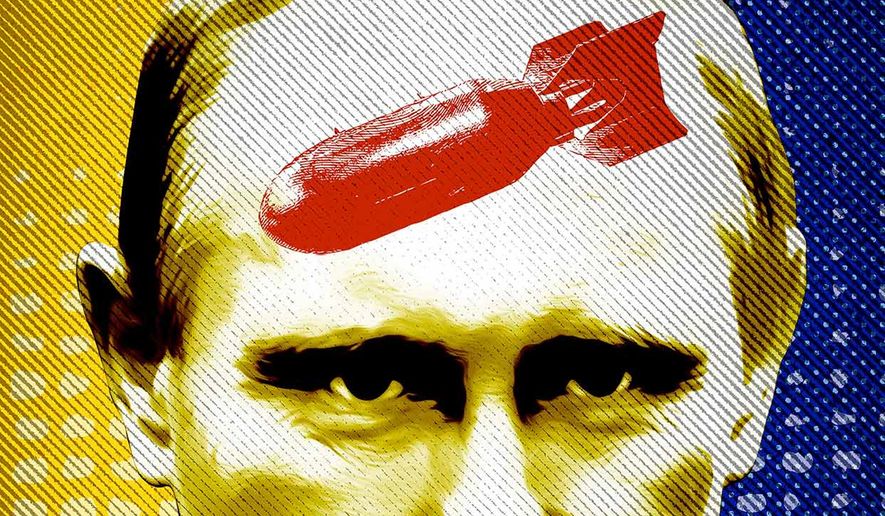OPINION:
Russian President Vladimir Putin has evidently learned how to stop worrying and love the bomb.
The day before his invasion of Ukraine began, Mr. Putin implied a threat that Russia would use nuclear weapons in response to any interference. He said, “… anyone who tries to interfere with us … must know that Russia’s response will be immediate and will lead you to such consequences as you have never before experienced in your history.” He added that Russia remains “one of the most powerful nuclear powers” with “certain advantages in a number of the latest types of weapons,” meaning the hypersonic missiles he revealed in 2018.
Days later, Mr. Putin put Russia’s nuclear forces on special alert.
If that was all we’d heard from Mr. Putin’s regime, it would concerning, but not terribly so. There have been, however, repeated rumors that U.S. intelligence officials had concluded that Russia might use chemical or tactical nuclear weapons (those of far smaller explosive yield than strategic weapons) in Ukraine.
The Pentagon says it does not believe Russia will use nuclear weapons in Ukraine, which is probably correct. Russia wants Ukraine with its agricultural production intact, not an incinerated version of it. Ukraine’s wheat, added to Russia’s, equals almost one-quarter of the world’s annual wheat production.
There are three other factors that indicate there is a considerable risk that Russian tactical nuclear weapons could be used in Ukraine.
First is that Mr. Putin and his regime have apparently convinced themselves that the only path for Russia to regain great power status is for it to reconquer Ukraine and other former Soviet states. A failure to do so would, in their minds, be an existential threat to Russia’s future.
Second is the Russian belief that Ukraine’s resistance to Russian conquest is a NATO proxy war. Mr. Lavrov said just that on April 23 when he warned that the West’s proxy war could escalate into a global nuclear war. He said, “The risk is serious, real. It should not be underestimated.”
On May 1, responding to the United Kingdom’s increased support for Ukrainian forces, Russian television broadcasted a propaganda video depicting a Russian nuclear attack on the United Kingdom. Its hosts proclaimed that European capitals could be struck in about two hundred seconds after launch.
All of this comprises the most serious nuclear saber-rattling since the end of the Cold War.
The third factor increasing the risk of a Russian nuclear attack in Ukraine is more serious than the propaganda video. It is Mr. Putin’s medical condition.
We have heard, for years, that Mr. Putin suffers from Parkinson’s Disease. People suffering from that disease commonly become delusional and hallucinate. Mr. Putin is now reported to have a serious cancer condition and, it is believed, will soon undergo surgery for it.
Mr. Putin has reportedly appointed Nikolai Patrushev, head of Russia’s Security Council, to take power while he is incapacitated by the surgery which could be for hours, days or months. If this is true, it creates a significant danger.
Mr. Patrushev, like most of Mr. Putin’s regime, is a “siloviki,” a former intelligence officer. He is a former KGB (and FSB) officer and an army general. Mr. Patrushev, very much the hard-liner, is believed to be playing an important role in the Ukraine invasion. He may be the person who convinced Mr. Putin that Ukraine is dominated by neo-Nazis.
The danger created by Mr. Patrushev’s appointment is the instability in Russia that would necessarily result from any prolonged incapacity of Mr. Putin. The longer Mr. Putin is incapacitated, the more likely Mr. Patrushev’s rivals will be to challenge his leadership. They could take actions — beyond the power Mr. Putin is apparently delegating to Mr. Patrushev — in Ukraine in hope of claiming a victory for themselves. The possibility of a nuclear or chemical attack against Ukraine would become more likely.
President Biden warned Mr. Putin against a chemical attack on Ukraine in March, saying that the U.S. would respond and that the response would depend on the nature of the attack.
In late February, 30 House Democrats wrote Mr. Biden a letter asserting that the president shouldn’t have exclusive control over nuclear launch codes and that the authority to order a nuclear strike should be shared with the vice president and speaker of the House.
The “Strangelove Letter” demonstrated that many in the president’s own party don’t trust him, for many reasons including his diminishing mental condition, with the power to authorize a nuclear strike.
Mr. Putin’s and Mr. Lavrov’s statements, even coupled with the video portraying a nuclear attack on the U.K., do not mean that Russia is prepared to use nuclear weapons in Ukraine. But it also doesn’t mean that Russia isn’t.
Mr. Putin and his regime haven’t raised the threat of nuclear war to the point that existed during the Cuban Missile Crisis of 1961. If Mr. Putin’s reported surgery incapacitates him for any period of time beyond a few days, the instability in Russia that will necessarily result will raise that threat enormously.
What would Mr. Biden do in response to a nuclear attack on Ukraine? He has, so far, been intimidated by Mr. Putin’s threats. If, during Mr. Putin’s incapacity, Russian instability results in a nuclear attack on Ukraine, all bets are off.
• Jed Babbin, a deputy undersecretary of defense in the George H.W. Bush administration, is the author of “In the Words of Our Enemies” and a Washington Times columnist.




Please read our comment policy before commenting.